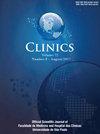CST1 promoted gastric cancer development by activating the AKT pathway
IF 2.4
4区 医学
Q2 MEDICINE, GENERAL & INTERNAL
引用次数: 0
Abstract
Background
Gastric Cancer (GC) was the third highest mortality rate among malignant tumors. Currently, no specific treatment is utilized to prevent the progression of GC. The detailed mechanism of GC was still elusive and this study aimed to clarify the mechanism of GC occurrence and development.
Method
This study was performed to clarify the molecular mechanisms of CST1 promoting GC development through activating AKT. The normal gastric tissue cells and GC cell was obtained, followed by transfection with oe-CST1 or sh-CST1, and their apoptosis and viability were evaluated. Finally, Western blot, Flow cytometry assay, Transwell assay, and Scratch assay were used to elucidate the molecular mechanisms of CST1 promoting GC development through activating the AKT pathway.
Results
Research outcomes show a significant elevation in CST1 and AKT protein as well as mRNA quantities in both the model and CST1-activator cohorts in relation to the control. Conversely, these proteins and mRNA concentrations were notably decreased in the presence of the CST1 inhibitor when compared to the model group, a difference that was statistically significant as evidenced by the p-value.
Conclusion
CST1 can promote the gastric cancer process by targeting the AKT pathway.
CST1通过激活AKT通路促进胃癌的发展。
背景:胃癌是恶性肿瘤中死亡率第三高的肿瘤。目前,尚无专门的治疗方法来预防胃癌的进展。气相色谱的具体机理尚不清楚,本研究旨在阐明气相色谱的发生和发展机理。方法:本研究旨在阐明CST1通过激活AKT促进GC发展的分子机制。取正常胃组织细胞和胃癌细胞,分别转染e- cst1和sh-CST1,观察其凋亡和生存能力。最后,采用Western blot、Flow cytometry、Transwell、Scratch等方法分析CST1通过激活AKT通路促进GC发展的分子机制。结果:研究结果显示,与对照组相比,模型组和CST1激活剂组的CST1和AKT蛋白以及mRNA数量均显著升高。相反,与模型组相比,CST1抑制剂存在时,这些蛋白和mRNA浓度明显降低,p值证明差异具有统计学意义。结论:CST1可通过靶向AKT通路促进胃癌的发生。
本文章由计算机程序翻译,如有差异,请以英文原文为准。
求助全文
约1分钟内获得全文
求助全文
来源期刊

Clinics
医学-医学:内科
CiteScore
4.10
自引率
3.70%
发文量
129
审稿时长
52 days
期刊介绍:
CLINICS is an electronic journal that publishes peer-reviewed articles in continuous flow, of interest to clinicians and researchers in the medical sciences. CLINICS complies with the policies of funding agencies which request or require deposition of the published articles that they fund into publicly available databases. CLINICS supports the position of the International Committee of Medical Journal Editors (ICMJE) on trial registration.
 求助内容:
求助内容: 应助结果提醒方式:
应助结果提醒方式:


